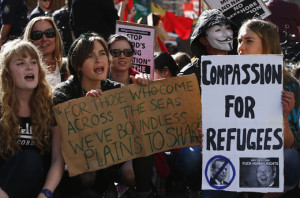By Kathryn Maureen Ryan
Impunity Watch, Managing Editor
ANKARA, Turkey – The Turkish government will allow Kurdish Peshmerga fighters from the Kurdistan region of northern Iraq to cross its territory to defend Kurds in the besieged Syrian border town of Kobani which has been under heavy attack from fighters loyal to the Islamic State of Iraq and the Levant (ISIS). The Peshmerga forces have been heavily invoked in the ground fighting against ISIS in Iraq.

The announcement marked an abrupt shift in the Turkish government’s official position of refusing to grant any aid to help the Kurds of Kobani and came just hours after the United States military dropped 24 tons of weapons and medicines to the besieged town. The Turkish government has been slow to respond to calls from the United States and other members of the International community to aid in the fight against ISIS. Turkey has cited its belief that Kurdish militants in the region, many of whom would like to see the establishment of a Kurdish State, are terrorists.
Last week Turkish F-16 and F-4 warplanes have bombed Kurdistan Workers’ Party (PKK) rebel targets near the Iraqi border, as the ceasefire reached between turkey and the PKK in March of last year comes under increasing strain. The Anatolia news agency reported that two PKK commanders wounded in fighting were arrested by Turkish authorities when they arrived for treatment at a hospital in south-eastern Turkey.
The Turkish armed forces say the airstrikes were carried out in response to a PKK shelling of a military outpost. Kurds are furious at Turkey’s inaction as Islamic State (IS) militants attack the Syrian border town of Kobani.
PKK Militants have been aiding the Kurdish People’s Protection Units (YPG) militia in Kobani. The Turkish government considers the YPG, like the PKK to be a terrorist organization and has refused to help aid the militia group in the fight against the Islamic State of Iraq and the Levant (ISIS).
Despite their status as one of the largest ethnic groups in the Middle East, with control of a semi-autonomous region in Iraq, the Kurdish people face discrimination in their homeland which spans across large regions of Turkey, Iraq, Iran, Syria, Armenia and Azerbaijan. The Kurdish people have become targets of the Islamic State of Iraq and the Levant (ISIS) as the militant group continues to gain ground in largely Kurdish regions of Syria and Iraq.
The war with ISIS has reignited tensions between the Kurdish people and the Turkish government. Tensions have risen in Turkey over the past several weeks. Demonstrations have been held in nearly 30 cities and curfews have been enforced for the first time in 22 years and state buildings have been attacked. Some of the fighting has been between the Turkey’s Kurdish populations. Turkey’s Islamist Hezbollah group supports ISIS while the banned PKK group is strongly opposed to ISIS,
The Turkish government’s decision to allow Peshmerga fighters to cross Turkish territory, just a week after targeting a Kurdish militants in its own country, may have been an attempt to both appease international calls for Turkish action against ISIS and to appease Kurdish populations in Turkey in order to prevent tensions in the country from continuing to rise.
For more information please see:
Bloomberg – Syria Kurds Say Peshmerga Must Work With Them in Kobani – 21 October 2014
The Guardian – Turkey to Allow Kurdish Peshmerga across Its Territory to Fight In Kobani – 20 October 2014
Reuters – Turkey to Help Kurdish ‘Peshmerga’ Fighters Reach Besieged Syrian Town – 20 October 2014
BBC News – Turkish Jets Bomb Kurdish PKK Rebels Near Iraq – 14 October 2014
BBC News – Turkey’s Fear of A Reignited Kurdish Flame – 8 October 2014


